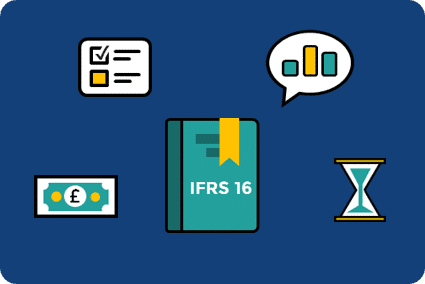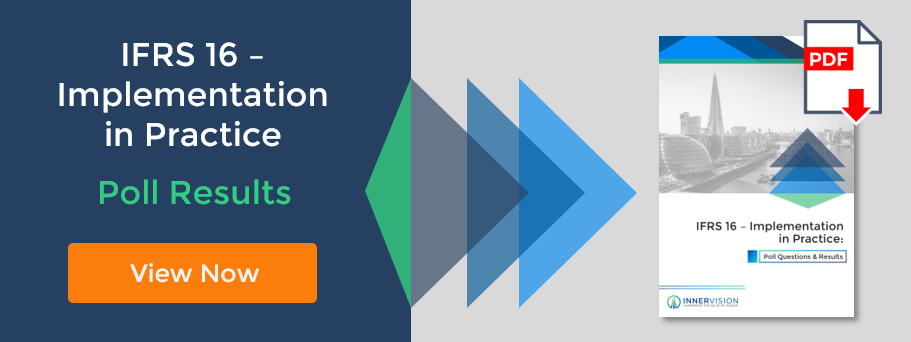New Poll Reveals Companies Are Behind in their Preparation for IFRS 16
Updated 26th May 2021 | 6 min read Published 14th June 2017

During a recent two-day conference (9th & 10th May 2017) on implementing the new lease accounting standards, hosted by the IFRS Foundation; over 70 finance and accounting professionals were polled on a variety of IFRS 16 related issues, ranging from the status of their transition projects and their readiness for compliance, to identifying the most prevalent implementation challenges that have arisen whilst transitioning to the new standard.
See more: IFRS 16 Overview and Lease Accounting Summary
The results of the lease accounting study highlight several key insights in relation to a company’s readiness for compliance, ranging from the current status of companies’ transition projects to identifying the most prevalent implementation challenges that have arisen whilst transitioning to the new standard.
Poll Highlights:
Interestingly, although somewhat concerning, the polling results demonstrate that the vast majority of companies are currently running slightly behind in their preparations for IFRS 16 and that a large percentage of lessees are actively managing their lease portfolios in a devolved way.
When answering if they know what leases are in existence or will fall under the scope of IFRS 16, a majority (85%) of all respondents said they have some idea but acknowledge that their existing contracts are held in a decentralised manner. Only 9% of respondents stated that they have full transparency of all contracts and leases-held in a dedicated repository.
The decentralised manner in which portfolios are currently managed is again highlighted by the fact that when asked where their lease data and contract information is stored, over half (59%) of the respondents’ state that currently their lease information is stored ‘all over the place’.
With the deadline for implementation fast approaching the need for complete and centralised data is ever present. If the 1st January 2019 deadline is to be met, companies should already be well on their way to understanding what leases are impacted and should have, at a minimum, started collating the relevant lease information on a centralised data repository.
Whilst it is still possible for companies to make adequate adjustments and implement the relevant processes, systems and controls required to ensure full compliance, companies should ideally be further along in their preparations if they are to give themselves enough time to make astute transition decisions that are in the best interests of their business.
The longer companies delay their implementation preparation, the fewer choices they will have surrounding certain accounting policy elections and judgements.
For example, if a company delays its implementation preparations for too long, they will have little choice but to apply the Modified Retrospective (Cumulative catch-up) transition method. This is because, to apply the Fully Retrospective approach, entities are required to report comparative figures for dual lease accounting standards simultaneously from 2018 onwards to demonstrate the difference between IAS 17 and IFRS 16. To achieve this companies will have to collate all the essential historic lease data and lease records early in the transition process i.e. by the end of 2017.
Companies Still in the Early Assessment Stages
With regards to what phase of the implementation project companies are in, 39% of respondents said that they are currently conducting impact assessments, while 25% reported that they are setting up a project team to manage the implementation. These findings indicate that the majority of companies have yet to make it past the early assessment phase of the project. Again, this is concerning considering the imminent implementation deadline.
Encouragingly, and somewhat relieving, only 6% of respondents said they have yet to start IFRS 16 implementation.
Transitioning to the new lease accounting standard, unfortunately, isn’t just as simple as bringing all off-balance sheet lease commitments (operating lease footnote disclosures) onto the balance sheet. In order to accurately record the appropriate assets and liabilities needed for full accounting compliance, entities will be required to reconsider existing processes, controls and IT systems in order to support a successful transition.
Nevertheless, what remains obvious is that organisations are faced with several complex challenges when transitioning to the new standards, with 33% of all respondents expecting the collation and validation of lease data to be the most significant challenge/difficulty of implementation. 22% anticipate the implementation of IT systems (including processes and controls) to be the most significant, while 27% anticipate an accumulation of challenges (all of the above).
Although many challenges exist, respondents still feel that transitioning to IFRS 16 offers several tangible business benefits and opportunities for lessees. With 36% seeing improvements to lease management as the main benefit, followed by 33% viewing increasing lease portfolio visibility as the principal opportunity. Whereas, 21% favour the enhancement of business processes and controls.
Lease Accounting Software to Play a Pivotal Role
In an effort to support a successful transition to the new accounting standard and to simplify compliance with IFRS 16 many organisations will need to evaluate and review the suitability of any existing lease accounting systems and processes. To accelerate the transition, they may also consider implementing new systems that allow them to automate elements of the lease accounting process that currently may be managed manually on antiquated applications such as spreadsheets.
Among polled respondents, when asked how far they are in identifying a lease accounting solution, 45% of respondents reported that they are currently researching potential vendors in the effort to implement a new system but perhaps alarmingly 33% have not yet started their search for an appropriate vendor/solution. Only 10% of respondents reported that they had already chosen a lease management and accounting system, while 8% responded that they are in the RFP stage of vendor/system selection. Just 4% of respondents intend on developing their own internal system.
These findings are consistent with earlier conclusions indicating that companies are currently still stuck in the early assessment and data collation phase of the implementation process and have yet to properly consider the important role technology will play at every phase of compliance – from collation and identification lease data and contract information, all the way though to producing the required calculations, accounting reports and audit trail.
To access the full Implementing IFRS 16 - Lease Accounting Poll, follow the link below.
How Lease Accounting Software Will Help
When transitioning to IFRS 16 the top 4 auditors are recommending that companies consider the adoption and deployment of appropriate lease accounting systems that will help simplify the implementation of either IFRS 16 or FASB ACS 842.
“Following the release of both new lease accounting standards, it's clear that creating a centralised, electronic repository of all equipment and real estate leases held should be a priority for companies with leased assets.”
Sean Torr, Advisory Managing Director and Lease Accounting Services Leader:
Deloitte
LOIS - Lease Accounting 2.0, By Innervision, is a hassle-free accounting solution that delivers all the transition tools and functionality needed to extract, validate and report on all the critical lease data required for full compliance with both IFRS 16 and FASB ASC 842.
Companies that use LOIS to manage and enhance their lease portfolio are able to produce all the accounting information required to accurately complete the financial statements obligatory for compliance; including income statement, cash flow and balance sheet. LOIS will also generate the complex accounting calculations for you.
7 Steps to Lease Accounting Compliance
For further guidance on implementing the new lease accounting standards we have put together this inclusive guide to transitioning to the new standards – IFRS 16 or FASB ASC 842. Just follow the link below to access the guide.








.png)